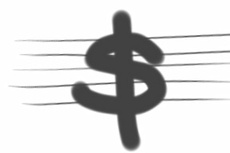There are American music schools where students don’t pay tuition. They’re free. The Curtis Institute in Philadelphia, the  Colburn School in Los Angeles, the graduate program at the Yale School of Music. Of course, admission to these programs is especially competitive.
Colburn School in Los Angeles, the graduate program at the Yale School of Music. Of course, admission to these programs is especially competitive.
How much should young musicians have to pay to study? Once, at my school, a prospective student from a very well-off family was awarded a full scholarship based on her merit. A faculty member told the student’s parents that since they could easily afford it, they should pay for their daughter’s education, allowing the funding to go to someone else. They did.
Now, in our school, there’s a cap on the amount of merit-based scholarship a student can receive. Other schools make no such limitation. As a result, a top student from a wealthy family could be offered at most about half the cost of our tuition. Juilliard would give the student a free ride.
Because the overall quality level of students varies considerably even between “elite” American music schools, a prospective student may receive very differring offers. Recently, several prospects have been accepted by us and awarded modest scholarships. (They were not high in our ranking.) I was surprized, but not too surprized, to learn that these same pianists were offerred full scholarships by other conservatories.
It’s not a simple matter to assemble a class that will have the best chance to flourish. We need good musicians with talent, of course. But some diversity is welcome — some sort of balance. To have some paying customers in the school may be a good thing, and not only for the institution’s balance sheet.
Gunther Schuller explained that he felt New England Conservatory ought to have at least a somewhat non-elitist mission. It is not necessarily the kids who are stars at 17 or 18 who will be significant music-makers.
The success of a musical education can’t really be measured in competitions won, jobs gotten — or assessed through the student’s musical performance at the time of graduation. What development will continue occurring? Is there a potential for lifelong learning? What will this musician bring to community, peers, or the world?

I totally agree with you!
You’re right … it’s all about the money. The vast sums of money used to carefully prepare a music student for years and years with the very best teachers, practice instruments, music camps, and opportunities certainly pays off at audition time. Those high merit awardees have been groomed for success in the same way SAT schools produce students with perfect scores. But for those of us who are middle class … who have struggled for years to provide the best musical education for our children (although inferior in every way due to the lack of money) get the NEC “modest scholarships.” Where are we to go but to the other “elite” schools that offer us … you guessed it … money. You ask, “what development will continue occurring?” … it depends on the money … “potential for lifelong learning?” … it depends on the money … “what will this musician bring to the community, peers, or the world?” … the richest, most beautiful pearl formed from years of struggle, toil, and determination. Yes, it all about the money.
http://www.youtube.com/watch?v=8_anbEJsr6s
I have some friends who have some extremely power singing voices yet, its so hard for them to get noticed. Mainly because of money. The music industry is not a easy business to get involved in
Hmmm
Reading this made me happy to be raised in social democratic Sweden where all education is free.
There are private institutions but the highest standards one are still the public.
I have been musically active for over 20 years now from the age of 7 and it would never have happened without the help of public free music schools.
-F
Its really amazing how crazy the whole education and scholarship system has become. Ive worked in this field for a long time and it never ceases to surprise me. The title of your article is dead on. Money does change everything and in my opinion keeps an unhealthy social balance alive.
http://ScholarshipsandGrantsInfo.com